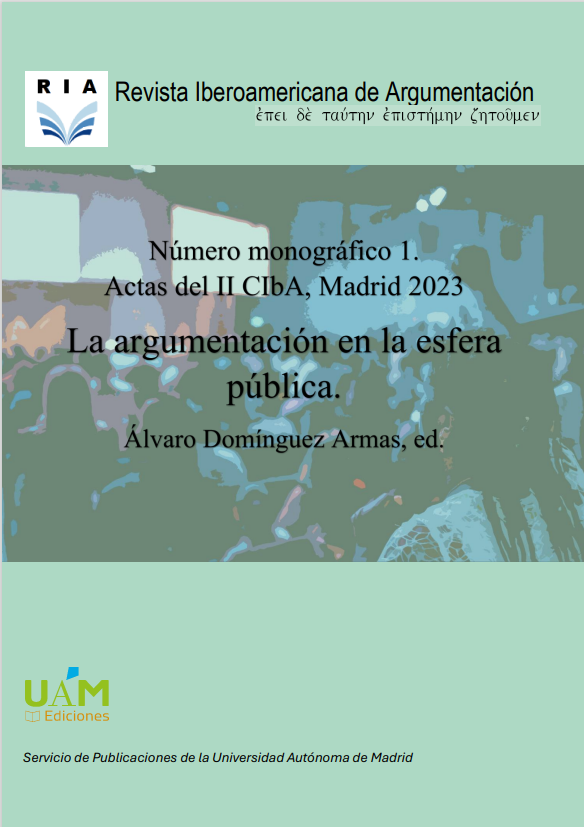The role of argumentation in disabling epistemic prejudice and epistemic injustice
Keywords:
argumentative activism, epistemic activism, epistemic injustice, prejudice, epistemic virtueCopyright (c) 2024 Revista Iberoamericana de Argumentación

This work is licensed under a Creative Commons Attribution-NonCommercial-NoDerivatives 4.0 International License.
Abstract
n this paper I will explore the problem of resistance to evidence that hinders the elimination of identity prejudice and
the importance of argumentation in combating it. First, I will analyse the relationship between Frickerian notions of
identity power and stereotype with argumentative injustice and the activity of arguing. I will argue that argumentation
is a ubiquitous element in debates about epistemic injustice, although it is not identical to argumentative injustice.
Next, I will address the notion of prejudice and the importance of critical-argumentative efforts to unmask it. I will
argue that the context of debate of epistemic injustices is disagreement, so that argumentative exchange is necessary
even to establish what is meant by epistemic virtue and the need to exercise it. Finally, I will argue that this kind of
exchange should be understood as a variant of what J. Medina calls "epistemic activism".
Downloads
References
Alhambra, J., Duarte, A., Martínez, M. y Vilanova, J. (2022). Argumentando sin piedad. Una introducción cinematográfica a la teoría de la argumentación. Madrid: Dykinson.
Bondy, P. (2010). “Argumentative Injustice”. Informal Logic 30/3, 263–278.
Fricker, M. (2007). Epistemic Injustice: Power and Ethics of Knowing, Oxford: Oxford University Press.
- (2016). “Epistemic Injustice and the Preservation of Ignorance”. En: R. Peels & M. Blaauw (Eds.), The Epistemic Dimensions of Ignorance (pp. 160-177). Cambridge: Cambridge University Press.
- (2017). Injusticia epistémica, Barcelona: Herder.
Gascón, J. A. (2022). “La injusticia epistémica y los límites de la virtud”. En: L. De Brasi, L. y C. Santibáñez (eds.). Injusticias epistémicas. Lima: Palestra.
Hundleby, C. (2022). “Argumentación y niveles de opresión epistémica”. En: L. De Brasi y C. Santibáñez (eds.). Injusticias epistémicas. Lima: Palestra.
Mill, J. S. (2000). “El sometimiento de la mujer” (1869). En: J. S. Mill y H. Taylor Mill, Ensayos sobre la igualdad sexual (pp. 145–177). Madrid: Antonio Machado Libros, colección Mínimo Tránsito.
Medina, J. (2021). “Injusticia epistémica y activismo epistémico en las protestas sociales feministas”. Revista latinoamericana de Filosofía política, 227-250.
Medina, J. and Whitt, M. S. (2021). “Epistemic activism and the politics of credibility. testimonial injustice inside/outside a North Carolina jail”. In: H. E. Grasswick and N. A. McHugh (eds.), Making the Case: Feminist and Critical Race Philosophers Engage Case Studies (pp. 293–324). Albany: Suny Press.
Nájera, E. (2023). “Heroicidad epistémica y conciencia feminista. Una reflexión a partir de los casos de Christine de Pizan y sor Juana Inés de la Cruz”. Isegoría. Revista de Filosofía moral y política, 69. https://doi.org/10.3989/isegoria.2023.69.15
Santibáñez, C. (2022). “Injusticia epistémica, argumentación y desacuerdo profundo. En: L. De Brasi, L. y C. Santibáñez (eds.). Injusticias epistémicas. Lima: Palestra.
